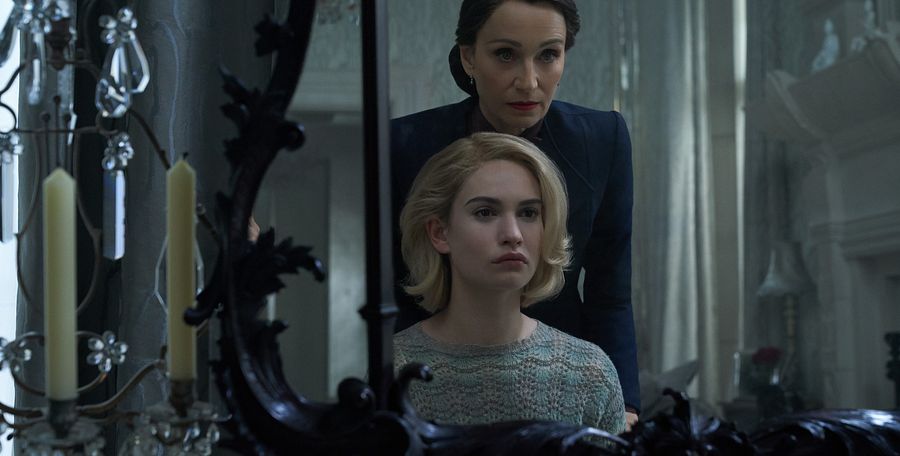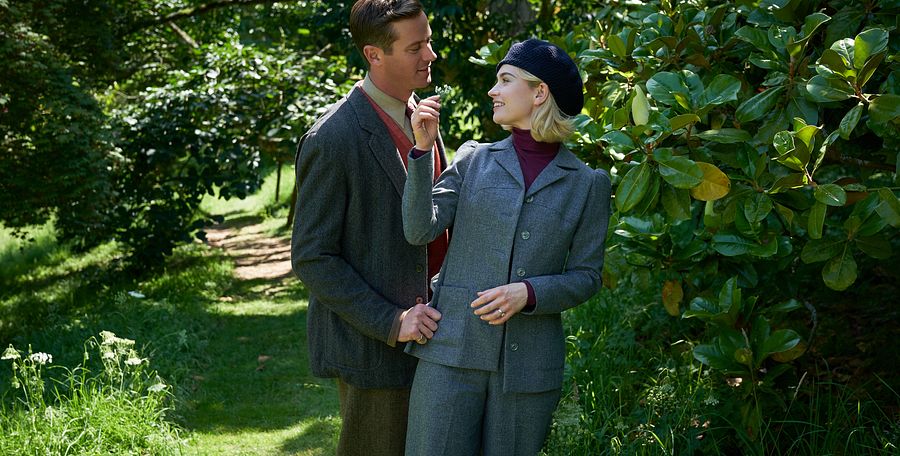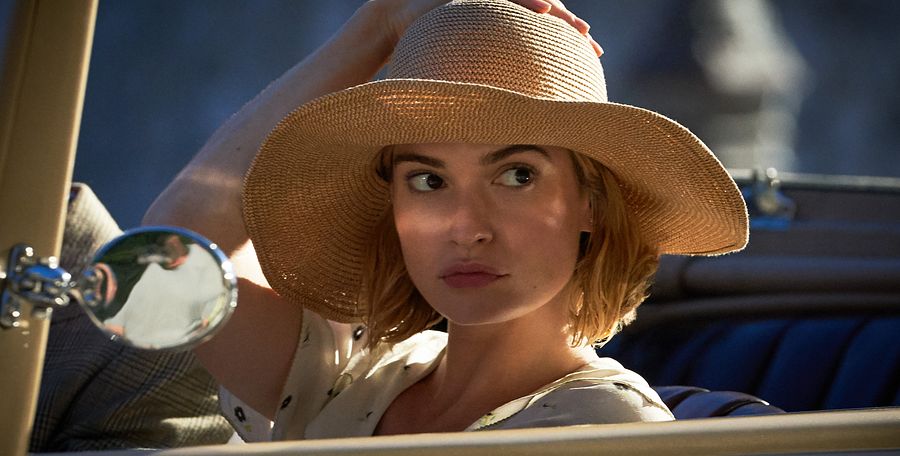'Rebecca' cast and director talk what makes their version different
Eighty years on from when the Alfred Hitchcock movie hit screens, a whole new adaptation of 'Rebecca' (starring Lily James and Armie Hammer) is making its way to Netflix.
For those unfamiliar with the premise of the Daphne du Maurier novel, it follows a young woman (James) who marries the man of her dreams, Maxim de Winter (Hammer). However soon after moving with him to the glamourous estate of Manderley, Mrs. de Winter feels the shadow of his former deceased wife, Rebecca, overhead. It doesn't help that the housekeeper Mrs. Danvers (Kristin Scott Thomas) is constantly taunting her.
We spoke to Kristin Scott Thomas about the iconic antagonist, and how this is a very different Danvers than what audiences have seen before.
“From the beginning I was very keen that she should be drier and colder than they originally suggested in the draft of the screenplay I’d read. That whole image - the way she’s dressed, all her complicated, sophisticated makeup, which was quite daring for somebody of her position - it tells you a lot.
“The clothes, the hair, the makeup, are all very strong, and all on purpose. It’s Mrs Danvers saying 'I am better than this, I am not your average housekeeper. I wear beautiful clothes, I look after myself very well, my hands are the hands of a lady’. It’s all signals to say ‘I am better than this’. When those images are framing your performance, you’re able to just drop into that character.”

The actress also spoke of how the movie is a whole new take on the du Maurier novel.
“We’ve done something very different. We’ve got to move away from the idea that it’s a remake, because it’s not. It’s a new adaptation of a novel, like so many of the good stories that we have. Like how many ‘King Lear’s are there, or how many versions of ‘Hamlet’ are there? And even ‘Hamlet’ is based on Sophocles.
“This story of a ghost and not being able to relinquish a ghost is a very, very intriguing story. And I’m sure there’ll be many, many more versions of this story.”
Director Ben Wheatley was also insistent that this is not a remake.
“It’s not a remake, it’s an adaptation of the book. I think that’s an important thing to state. Moreover the original Hitchcock version has got massive bits of plot missing from it. So I would make the argument that we haven’t actually seen a filmed version of the book yet, solidly.”
Regarding it being compared to the 1940 movie, Wheatley says:
“I didn’t feel like the Hitchcock version was hanging over it. I think that what was hanging over it was the book. Hitchcock didn’t write 'Rebecca', but he gets a lot of credit for it, it seems.
“I think the updating of it is interesting, because I reread the book after I rewrote the script and I felt that there’s something very modern in the book. On the one hand, it’s got the DNA and the blueprint for a lot of thriller novels and thriller cinema inside it, and you've seen those characters and events again and again, and I think that’s why the idea of 'Rebecca' feels like there’s a massive shadow cast over it. But at the same time the things that it does haven’t really been repeated, like the moral structure of the story - there’s a murder in the middle of it which is unsolved and unpunished, and the audience kind of wills the murderer to not be caught, which is very different from the things we see now.
“I think that the ideas of privilege and being able to swan through life and literally get away with murder is a very modern idea.”

Wheatley also spoke about casting his leads, Armie Hammer and Lily James. Regarding the former:
“With Armie what was interesting about him was that there’s in part he’s a man out of time and a kind of ‘50s matinee idol. But then he can also play the weakness and the collapse that you need to make the beginning of the movie work. There’s romance there and you believe in it, but then over time it collapses. Without it the audience would be thinking ‘why doesn’t she just leave him, if there’s no love there to start with?’ That was a departure there from the original text that we wanted to shore up. It was important that he wasn’t so obnoxious that you just don’t care.”
As for the leading lady, the director notes:
“Then with Lily what was important with her is that there’s a likeability there. She needed to hold that character and play the anxiety without having the audience turn against her. That was always the worry because she’s a character so full of doubt and worried about herself all the time. The audience might be like ‘just wake up! Sort yourself out’, because that's how a modern audience might view that character. But she’s able to play both of those sides, she’s strong but not so strong that it feels out of time and breaks the film.”
Lily James spoke of her character, the so-called Mrs. de Winter, also.
“There were a lot of discussions about how a modern audience would relate to my character because she’s very timid and I think nowadays when young people read the book they relate much more to Rebecca. She’s this fiercely independent woman who defies the norms, lives by her own rules and doesn’t obey her husband.
“But I also felt in order to make the journey complete, I really wanted to play up the flip side of that, which is young girls and other people who feel completely insecure and inadequate and have impostor syndrome and don’t feel good enough. Because there are a lot of young people out there who will still relate to that, no matter how far we’ve moved forward in feminism.
“So I really wanted to embrace the fact that she doesn’t really have agency and she is kind of a weak character in the beginning in order to accentuate the journey because I think by the end, through her own very twisted route, and revealing sides of herself that are pretty dark and maybe indefensible, she does find her own power. As Maxim’s decreases, she sort of takes care of him and that power play is fascinating. So the bigger the disparity between it, the greater the reward, I think, within the story.”

Armie Hammer also offers his thoughts on things from the perspective of his character, Maxim.
“I think for Maxim when he sees the soon to be Mrs. De Winter, he sees an opportunity for change. I think he sees something in her that his previous wife didn’t have, which is the ability to be kind and nice and to let him sort of be who he is. She is sweet whereas we come to find out that Rebecca, originally, treated him terribly. So I think it’s a big opportunity for change for him.
“I think you just don’t let something like that go. Things get tough but you don’t measure a relationship by how well things are going when things are going well. I mean if they were just in the south of France it would be a delightful film to watch, but they wouldn’t have to go through anything.”

